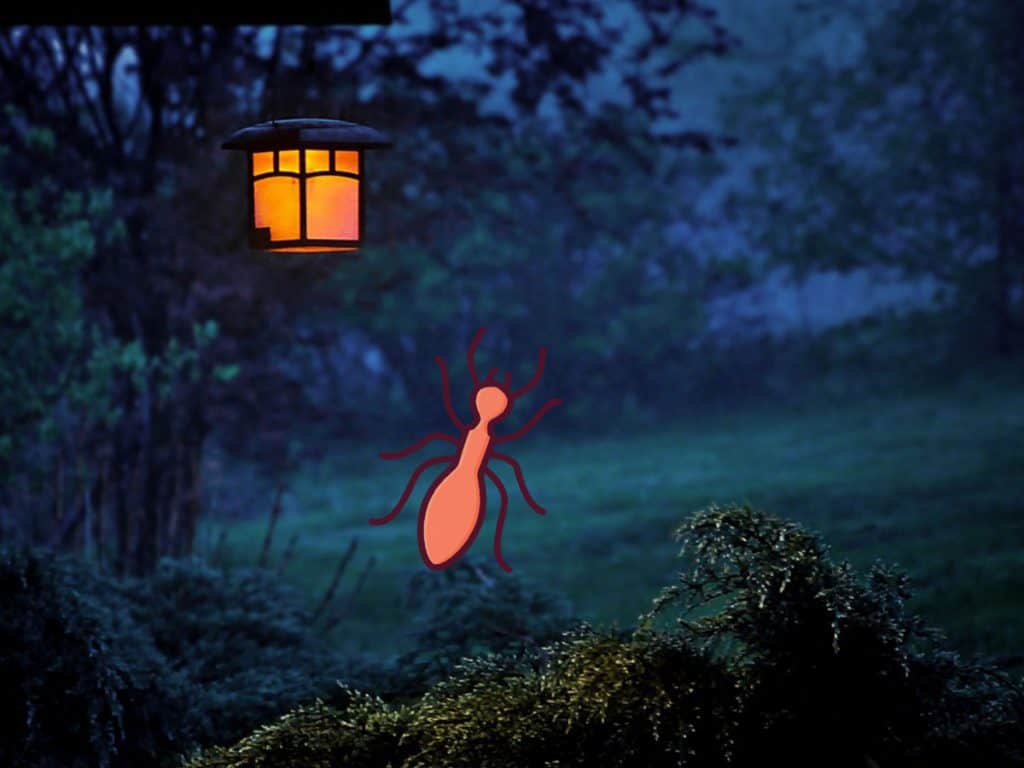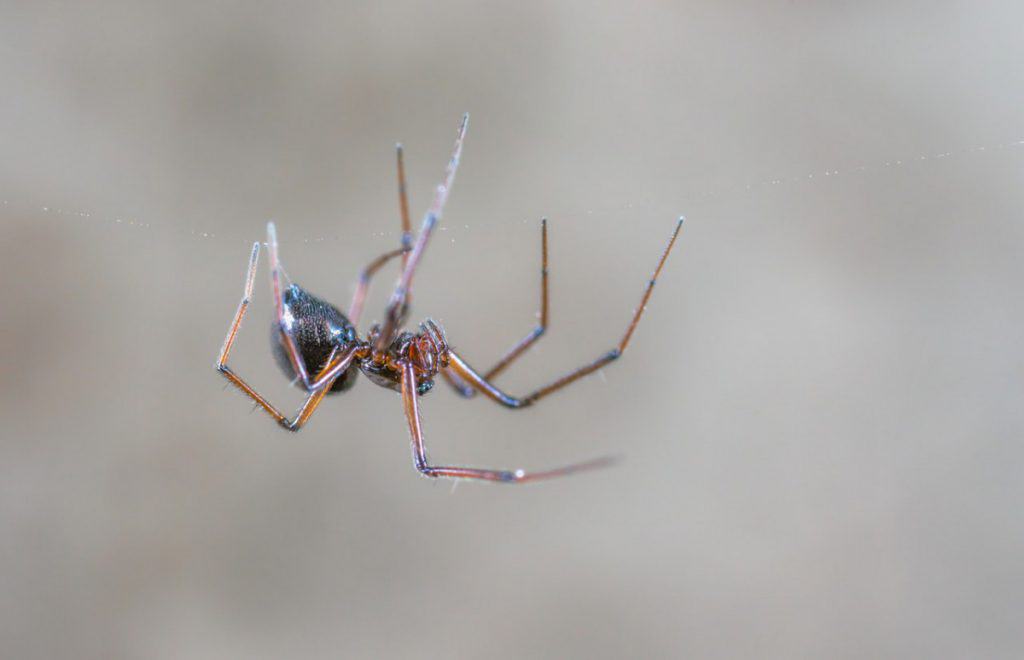
If you enjoy reading this article, why not check out our articles on How Long do Ants Live? The Complete Answer and Can Spiders Swim? Let’s Find Out
How Do Spiders Sleep Or Rest?
Do Spiders Even Sleep?
When it comes to the question of if spiders sleep, the answer is that they do not close their eyes and, “Catch some Zzz,” in the same manner humans and other animals do (in fact, spiders do not even have eyelids, so their eyes are always open).
With that said, spiders do have periods in which they rest much as other creatures do–they follow a circadian rhythm where they are generally less active during the day and more active at night–adjusting this as needed (for example if a web-weaving spider catches an insect that flies into its web at 1:00 PM it will not wait until the evening to take advantage of its meal).
How Does a Spider Sleep?
Therefore, while spiders do not “Sleep,” in the conventional sense, they do sleep in their own special slightly-aware way where they might be resting one minute, but if the chance for snack arises, they will jump into action! There are other questions about how just how exactly spiders sleep that are worth further discussion so read on for, “A’s,” for your, ‘Q’s in our Q&A!
How Long Do Spiders Normally Sleep?

As was mentioned above, spiders do follow a circadian rhythm, with many resting during the day and being more active at night. When a spider is sleeping it does still have some awareness of its surroundings, with its nerves ready to react should a predator (such as a bird or other large animal) be near or if some prey happens to crawl by/get caught in a spider’s web.
Body Language
When a spider is sleeping it is in a lower metabolic state where it is conserving its energy–something very handy for if a spider is waiting for its meal or needs to hide during the day before coming out at night to hunt for food. Depending on the weather/temperature (more on this later) and how much daylight there is in addition to the availability of prey a spider may rest for some hours or even days should there not be much to eat. In general, though, many spiders will sleep during the day and hunt/eat at night.
Do Some Kinds of Spiders Sleep More Than Others?
Spider Myths about sleeping habits
When taking into account how a spider’s style of sleep is more of a resting-state with a lower metabolism, the answer to this question is, “It can vary.” Depending on how much food a spider has available it may need to rest more or less. The kinds of spiders who do not weave webs but crawl around and jump or their prey arguably have to rest less than other kinds which weave a web and then wait patiently for prey–but all that web-weaving expends a ton of energy too, so after making a complex web some rest is well-earned.
Types of spiders and their sleeping habits
Then, there are spiders that don’t hunt for prey or weave a web but might burrow a little bit underground and emerge to grab their prey (like Wolf spiders) or make a trap-door of sorts they use to catch prey (Trapdoor spiders). Want to know more about Wolf spiders and where they like to hang out?? Read this article: Where do Wolf Spiders Go in the Winter?
When a spider does not have a lot of food around it may have to rest until there is a chance to eat or hunt, so while one day a web-weaving spider may rest for hours upon hours and in the meantime a Wolf spider is busy grabbing prey and eating, that could very well be different the next day when a web-weaving spider has a bunch of captured prey to munch upon and the Wolf spider is sitting and snoozing in its lower metabolic state while it waits awhile for something tasty to come close enough to grab.
Basically, it is not so much a question of if certain kinds of spiders sleep more so much as it is a scenario of if they need to rest to converse energy while waiting for food!
Do Spiders Sleep Upside Down?

Certain kinds of spiders spend plenty of their lives upside down. They will often feed, breed, and even, “Walk,” in an upside-down state and therefore will not hesitate to rest while upside down too. While most land animals spend their time walking on the ground, many spiders would rather suspend themselves by their legs while hanging from a ceiling, tree, or their web–then using gravity to help them swing-around.
Do spiders sleep on their backs?
While some species of spiders (especially those that do not weave webs) do in fact spend their time crawling around looking for prey (Tarantulas do not weave webs, for example) the kinds of spiders who spend a good deal of time hanging-out upside down usually make webs and also have longer legs to assist with swinging around; they are so comfortable upside-down sleeping while in that position is no big deal for them.
Why do spiders hang upside down?
Basically, spiders that do not weave webs are more likely to sleep in a regular manner, but web-weaving spiders will often be upside down or sideways when they rest, especially if they are sleeping while waiting for a meal to land upon/fly into their web.
Do Spiders Hibernate or Sleep More in the Winter?
Spiders generally do not survive that well in the cold. Some species can do okay in cooler climates but generally, most spiders are found in places that are warm.
Where do spiders go in the wintertime?
To deal with cooler weather spiders will tend to sleep more via entering their low metabolic state where they are resting and conserving less energy. In addition, when it is cold spiders might pull their legs in some and, “Tuck,” them under their body to hold-in more heat while resting.
What happens to spiders in the winter?
Should an opportunity to eat arise the spider may suddenly, “Wake,” and eat its prey, but often a cold spider will tuck its legs in and rest until it is a bit warmer, at which point it will actively seek-out someplace toasty and dry. This is one reason you might see more spiders in your house during the winter, they are trying to escape the cold!
Want to know where other bugs go in the winter? You may be interested in this article about ants: Where Do Ants Live in Winter?
Do Spiders Curl-Up When Asleep?
Spiders may tuck-in their legs when they are chilly, but they do not really, “Curl-up,” in the traditional sense. In fact, a spider that has curled-up is most likely dead. When there is no longer blood pumping through the spider’s body it is almost like hydraulics shutting-off.
Why do spiders curl up?
With so many nerves in their body, there is a lot of neurological activity firing-off and should the blood not be pumping to keep everything functioning it all just kind of shrivels up. A spider that is conserving its metabolism through sleep or trying to stay warm might tuck its legs in some, but a spider that is all curled-up is probably just dead.
Can Spiders Dream?
While it might be fun to imagine spiders having happy dreams of plentiful flies to eat or nightmares about angry humans swatting at them with newspapers, spiders simply do not dream. This is because (as discussed) they do not sleep in the same way as us.
Humans and other animals (especially mammals) that have been studied enter a stage of sleep known as, “REM,” which is where we dream. Even some animals that are not mammals–like birds and possibly even lizards–have been observed to have REM sleep and therefore are most likely having dreams.
Spiders do not enter REM sleep, however, they are just at a reduced metabolic rate that allows them to rest but still be relatively aware of their surroundings. A sleeping Tiger in REM sleep won’t realize if an antelope is nearby to grab and eat, but a sleeping spider will readily grab some prey as its form of sleep is so different. While it might be a little sad to think spiders never get to have fun dreams, they simply don’t need them as much as they do awareness of what is going on around them so they can eat–or avoid being eaten themselves!
Closing Thoughts on Spiders and Snoozing
Even though Spiders may not sleep in the same way humans or other kinds of animals do, they clearly sleep in their own unique way. By making their metabolism less active and tucking-in their legs as needed if they are cold a spider can sleep for hours or even days to conserve energy and be ready to act should the opportunity arise to eat or if there is a sudden need to run from a predator.
Spiders will often follow their own circadian rhythm as well, being less active during the day and focusing on hunting or weaving webs at night (unless there is simply no food or the weather is cold, at which point days of resting may occur). Even if spiders do not sleep in the traditional sense (e.g. they don’t close their eyes and are incapable of dreaming), they do still get to, “Relax,” and be less active–albeit in a manner where even if resting they are ready to move at a moment’s notice should it be necessary.
Spiders sleep in their own special way and whether its upside down, right-side up, on a web, or in a burrow, it allows them to have plenty of energy for their main purposes in life–eating and breeding. In that sense, spiders are a lot like every other animal in that they know they need to be rested to eat or mate!
Therefore, the next time you see a spider that is very still and has maybe tucked its legs in you’ll know that spider is sleeping, but also still ready to run should you try to catch or smash it!
If you enjoyed reading this article, why not check out our articles on What Can Termites Chew Through? Let’s Find Out and What Color are Praying Mantis’? Blue, Green, etc.
Recent Posts
Tiny Black Bugs in Bathroom NO WINGS: What They Are and What to Do!
Finding tiny black bugs in your bathroom can be uncomfortable, to say the least. Especially if they are persistent, or they appear in very large numbers, which they often like to do. When it...
Tiny Black Bugs in Plant Soil - What Are They & What To Do About It
A short horror story: You get a new houseplant. You do your best to take care of it. You’ve ensured that it has the right soil, the right amount of sun, it gets enough water. And then one day, you...

